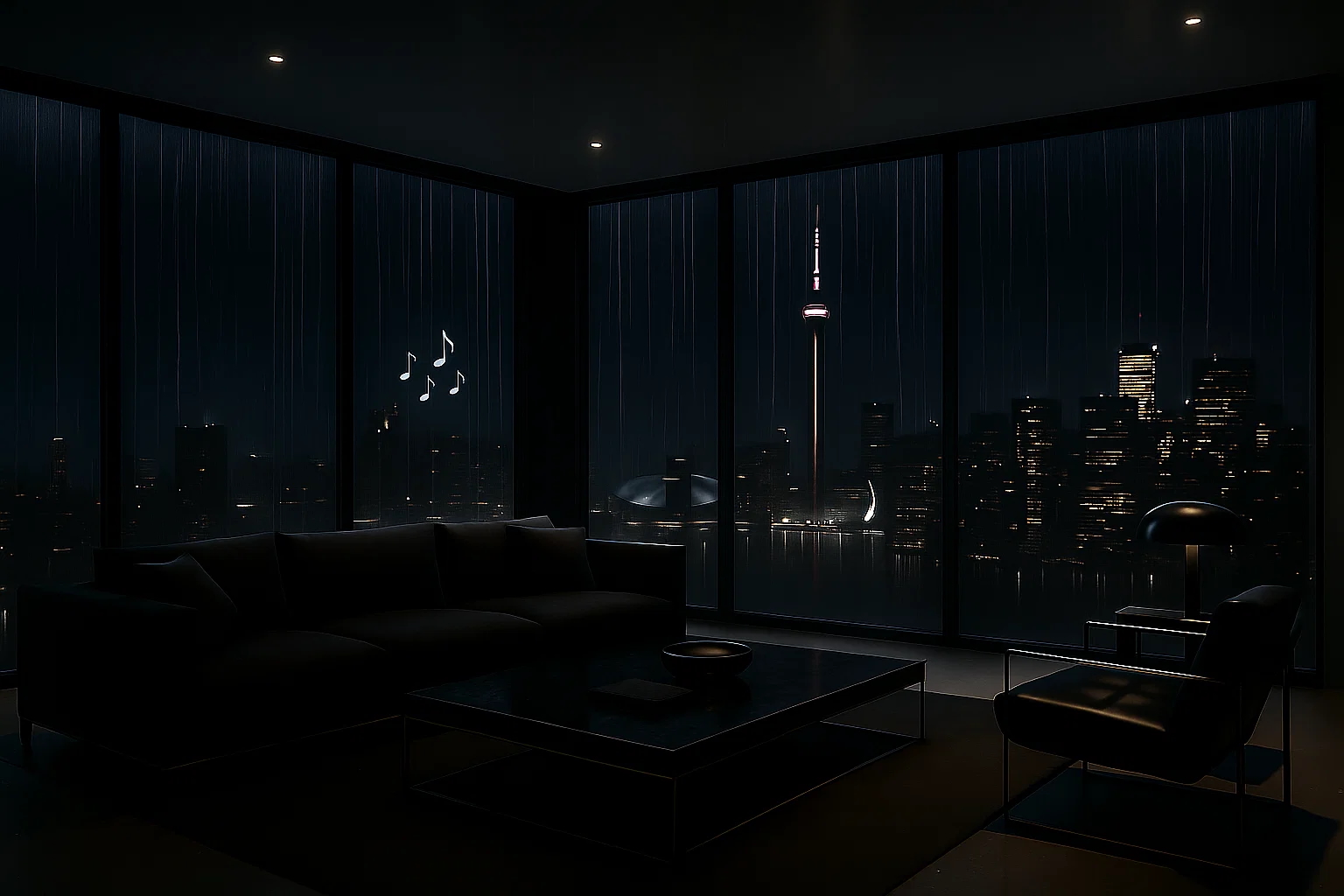
Drake, in Search of Lost Time by Benjamin Krusling
August 11, 2025 – IMAX interiorities and inside voices, from the hookah cloud of doom.
 www.theparisreview.org
www.theparisreview.org
Drake, in Search of Lost Time
Benjamin Krusling
Image generated by Sora, August 4, 2025.
Disappointment has a placid surface—the word is buttoned-up, its gesture to an inner world prioritizing mild description over emotional urgency, an indication simply that what one wished for went left, fell short. Admitting disappointment in others, in circumstances, can be a moment of quiet devastation, but to describe something as “disappointing” is a means of forestalling tears, putting them on the other side of a line. In pop culture, Drake is disappointment’s mouthpiece and its walking embodiment—it’s almost all he talks about and all one seems to hear about his music and persona. At his best, he is disappointment’s major-label poet, if you’re still willing to go there with me now that his utter ubiquity and industrial-strength productivity have, in the last decade, evacuated what remained of those early days of critical respect. Just as disappointment doesn’t often bring more than a few tears to the eye, Drake’s songs don’t, or don’t let themselves, go loudly to that part of the spirit that cries out for something more. Almost every song, always mixed to a streaming-optimized sheen, is a litany of feelings that are ever so slightly bitter, muted, a half Xan’s worth of narcotized. Psychological and calculating but only rarely soulful, just ceaseless solipsism cut sometimes by the urge to seduce or make music for women to dance to, all delivered with the charming evenness of the lounge singer whose chief pleasure is to give you what you came for.
Unfortunately, I love it. This multialbum monologue of someone who has decided in advance to never break down—“I’ll probably self-destruct if I ever lose, but I never do,” et cetera—who gets rejected by women, colleagues, idols, “the culture,” and, in rare moments of real lucidity, himself, has burrowed so deeply into my nervous system that instead of compulsive counting to make it through long train and elevator rides, I rap or sing these songs to myself, over and over and over, without end, with minor regret.
Without end because the songs are deeply, miraculously sticky; with regret because not only does Drake’s hermetic world feel like a retreat from the real one, but he is also difficult to defend from any angle besides pleasure. For example, Drake is a man of the people, or he tries to be: he’s rapped and sang in at least three or four black Anglophone dialects and dabbled in French, Arabic, and Spanish, too, as the mood, or market, strikes. But it’s hard to be a man of the people and also completely neurotic, so when the diss track that, through its own series of familiar national chauvinisms, went stupidly viral by eviscerating his obvious desire to Represent and Belong, he bowed out of the drama with a deflated, byzantine response (“The Heart Part 6”) that presented himself more as a private mastermind, planting fake info and pulling all kinds of secret strings, than a public icon who can count on the love of a congregation. The ubiquity of “Not Like Us,” however, feels like beating a cheesy joke even when the horse is dead, to paraphrase Earl, and at most like a simultaneous release and containment of oppositional political energies that have had almost no expression at a national or international level. (Only one person was arrested for their political views at Kendrick’s halftime show, and it wasn’t Kendrick.)
In other words, popular discourse has made it difficult to process Drake’s continued success—but I suspect there is something important there to process. Take “Texts Go Green,” the polyrhythmic, Afro-house masterpiece from Honestly, Nevermind and the purest and most sublime distillation of his late bitterness, its greatness and immaturity locking talons and plunging through the air of a vague narrative about a woman who left him and wants him back, even though he’s so over it. “If I come around you, can I be myself?” he begins. Then, after a series of small, trollish reversals, another late-Drake trope—“Well, don’t wanna make something from nothing, that’s where I be / Well, keep getting nothing from something, how’s that fair to me? / I’m thinking something for something, that’s what I need”—this song about moving on from the person least able to move on peaks, or maybe valleys, with the mini-refrain “I feel like everything these days leads to nothing,” getting straight to the center of a global structure of feeling that most of us can easily identify, whether we accept it or rage against it. On a leaked song, “Like I’m Supposed To/Do Things,” about a woman visibly flirting with Drake while he tells his more important romantic interest that she has nothing to worry about, he sings “you know I don’t ever change / Right here for you always.” How can she, we, believe him? But he seems, temporarily at least, to believe it, and in his total, momentary conviction, something sad and troubling seeps in—future hurt, disappointment, a hookah cloud of doom.
Reading through Proust in the past year, whom I think I’ve been drawn to out of a desire for momentary immersion in scale and duration, I’ve noticed a similar, resonant cloud of doom hovering inside the narrative’s baroquely described salons and aesthetic reflections. The resonances between Drake and Proust are many, not least of which the notion that money and competition are the drivers of life and that jealousy is the content of love. Drake’s love songs—or rather his relationship songs, since the love they speak of is almost never offered or secured—suggest that for his moneyed set of international, trips-to-Dubai, clubbed-out, bottle-serviced celebrities and hangers-on, love is all power and bitterness, back and forth, like that, forever. Just like In Search of Lost Time, the narrative trajectory of Drake’s albums shows us an arriviste filled with hope and enthusiasm for a world of art and success who finds himself increasingly shaped and embittered by that world’s ruthless quest to produce the outsider. And, like Drake, Proust’s narrator is best enjoyed against his own grain, since his diagnoses of society’s ills don’t stop him from embodying the worst of them.
Meanwhile, his productivity is as incessant and anxious as Spotify or Netflix, perfect for a moment when life presents itself as a nonchoice between total grind or total despair. He’s a disruptor from the least semi of U.S. peripheries who suggested a slightly new model of popular rap masculinity only to install a mostly familiar misogyny, a numbers-obsessed winner whose latest turn to shilling for a sports-betting company, as diagnosed by Kieran Press-Reynolds, shows a man who can’t help but keep his finger on the depressing pulse. Proust, too, liked to gamble: according to Hannah Freed-Thall (“Speculative Modernism: Proust and the Stock Market”), “y the start of the First World War he had managed to squander about a third of his fortune on stocks.” I thought of Jean Moreau in La baie des anges (1963): “What I love about gambling is this idiotic life of luxury and poverty,” neatly summarizing the thematic poles of mainstream hip-hop as well as the rough seesawing of pleasure and pain that quick millions seem to produce. “Don’t know how to express my love … that’s why I American Express my love for you,” a dead-serious joke (“Search & Rescue”).
So, the volatility of value is Drake’s great subject, to use Hannah Freed-Thall’s phrase, and, in our new age of widespread gambling—which has led to increases in bankruptcy, debt, and domestic violence—his voice is the codeine soul of a pitiless economic machine that produces desperate losers and paranoid, precarious winners. “Is there more to life than all of these corporate ties and all of these fortunate times and all of these asses that never come in proportionate size?” Herein lies the emotional core of this music, which is always just offstage, always outside the world and the people in it. Nothing really feels good. Nothing is dependable, fair or just.
Last edited: